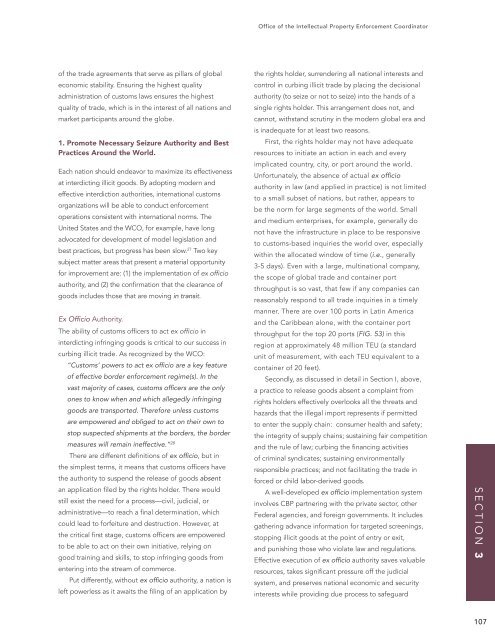ENFORCEMENT
2h1EjNw
2h1EjNw
Create successful ePaper yourself
Turn your PDF publications into a flip-book with our unique Google optimized e-Paper software.
Office of the Intellectual Property Enforcement Coordinator<br />
of the trade agreements that serve as pillars of global<br />
economic stability. Ensuring the highest quality<br />
administration of customs laws ensures the highest<br />
quality of trade, which is in the interest of all nations and<br />
market participants around the globe.<br />
1. Promote Necessary Seizure Authority and Best<br />
Practices Around the World.<br />
Each nation should endeavor to maximize its effectiveness<br />
at interdicting illicit goods. By adopting modern and<br />
effective interdiction authorities, international customs<br />
organizations will be able to conduct enforcement<br />
operations consistent with international norms. The<br />
United States and the WCO, for example, have long<br />
advocated for development of model legislation and<br />
best practices, but progress has been slow. 27 Two key<br />
subject matter areas that present a material opportunity<br />
for improvement are: (1) the implementation of ex officio<br />
authority, and (2) the confirmation that the clearance of<br />
goods includes those that are moving in transit.<br />
Ex Officio Authority.<br />
The ability of customs officers to act ex officio in<br />
interdicting infringing goods is critical to our success in<br />
curbing illicit trade. As recognized by the WCO:<br />
“Customs’ powers to act ex officio are a key feature<br />
of effective border enforcement regime(s). In the<br />
vast majority of cases, customs officers are the only<br />
ones to know when and which allegedly infringing<br />
goods are transported. Therefore unless customs<br />
are empowered and obliged to act on their own to<br />
stop suspected shipments at the borders, the border<br />
measures will remain ineffective.” 28<br />
There are different definitions of ex officio, but in<br />
the simplest terms, it means that customs officers have<br />
the authority to suspend the release of goods absent<br />
an application filed by the rights holder. There would<br />
still exist the need for a process—civil, judicial, or<br />
administrative—to reach a final determination, which<br />
could lead to forfeiture and destruction. However, at<br />
the critical first stage, customs officers are empowered<br />
to be able to act on their own initiative, relying on<br />
good training and skills, to stop infringing goods from<br />
entering into the stream of commerce.<br />
Put differently, without ex officio authority, a nation is<br />
left powerless as it awaits the filing of an application by<br />
the rights holder, surrendering all national interests and<br />
control in curbing illicit trade by placing the decisional<br />
authority (to seize or not to seize) into the hands of a<br />
single rights holder. This arrangement does not, and<br />
cannot, withstand scrutiny in the modern global era and<br />
is inadequate for at least two reasons.<br />
First, the rights holder may not have adequate<br />
resources to initiate an action in each and every<br />
implicated country, city, or port around the world.<br />
Unfortunately, the absence of actual ex officio<br />
authority in law (and applied in practice) is not limited<br />
to a small subset of nations, but rather, appears to<br />
be the norm for large segments of the world. Small<br />
and medium enterprises, for example, generally do<br />
not have the infrastructure in place to be responsive<br />
to customs-based inquiries the world over, especially<br />
within the allocated window of time (i.e., generally<br />
3-5 days). Even with a large, multinational company,<br />
the scope of global trade and container port<br />
throughput is so vast, that few if any companies can<br />
reasonably respond to all trade inquiries in a timely<br />
manner. There are over 100 ports in Latin America<br />
and the Caribbean alone, with the container port<br />
throughput for the top 20 ports (FIG. 53) in this<br />
region at approximately 48 million TEU (a standard<br />
unit of measurement, with each TEU equivalent to a<br />
container of 20 feet).<br />
Secondly, as discussed in detail in Section I, above,<br />
a practice to release goods absent a complaint from<br />
rights holders effectively overlooks all the threats and<br />
hazards that the illegal import represents if permitted<br />
to enter the supply chain: consumer health and safety;<br />
the integrity of supply chains; sustaining fair competition<br />
and the rule of law; curbing the financing activities<br />
of criminal syndicates; sustaining environmentally<br />
responsible practices; and not facilitating the trade in<br />
forced or child labor-derived goods.<br />
A well-developed ex officio implementation system<br />
involves CBP partnering with the private sector, other<br />
Federal agencies, and foreign governments. It includes<br />
gathering advance information for targeted screenings,<br />
stopping illicit goods at the point of entry or exit,<br />
and punishing those who violate law and regulations.<br />
Effective execution of ex officio authority saves valuable<br />
resources, takes significant pressure off the judicial<br />
system, and preserves national economic and security<br />
interests while providing due process to safeguard<br />
SECTION 3<br />
107


